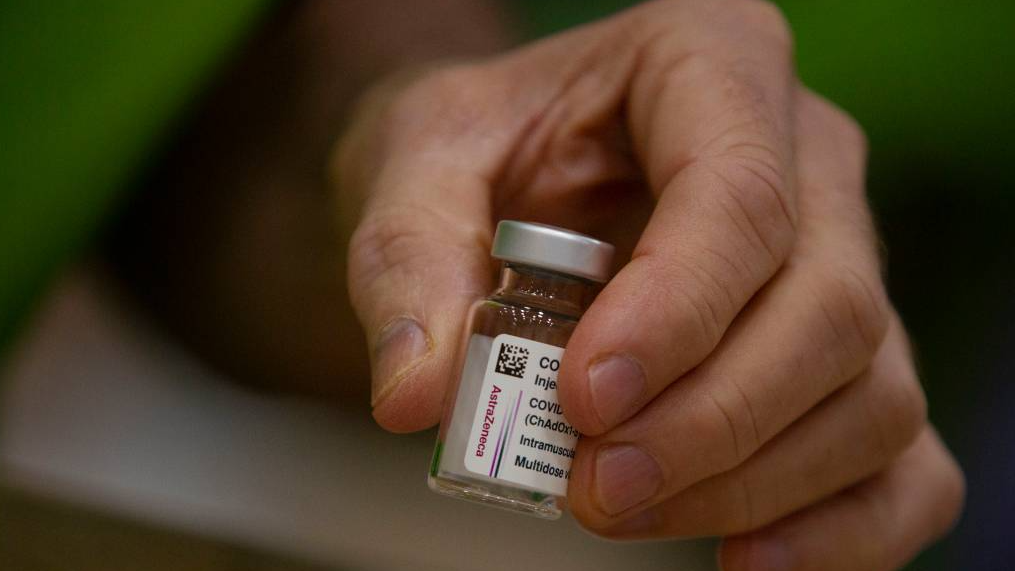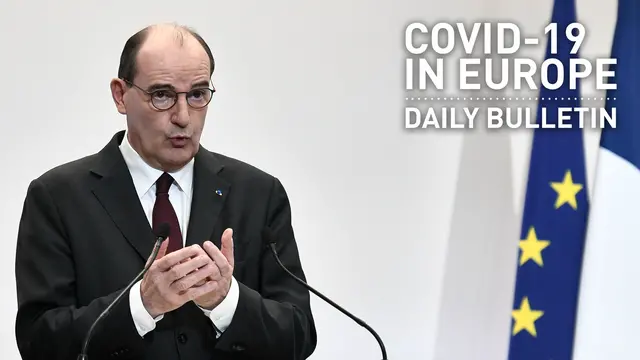TOP HEADLINES
-
France has entered a third wave of the pandemic following a surge in new infections , according to Prime Minister Jean Castex, who added that the variant first discovered in the UK is "becoming more and more present."
-
Lithuania has become the latest European country to ban the use of the AstraZeneca jab as "a precaution" until Europe's drug regulator, the European Medicines Agency, gives a full evaluation of its safety, Health Minister Arturas Dulkys has said.
-
England's health authorities have reported the first two cases of the new variant first discovered in the Philippines . One of the cases has been linked to international travel, while the other is still being investigated.
-
Iceland is to allow entry to all visitors regardless of their country of origin if they can provide proof of a vaccination from Thursday, the health ministry said. "All those who have been fully vaccinated against COVID-19 will be allowed to travel toIcelandwithout being subject to border measures, such as testing and quarantine," it added.
-
France's Prime Minister Jean Castex says he intends to get the Oxford University-AstraZeneca vaccine as soon as the European health authorities confirm the jab is safe, amid reports of people suffering from blood clots after getting the shot.
-
Enforcing a weekend lockdown in the Greater Paris region may not be enough to slow the spread of the virus , the president of the commission of Paris's hospitals organization, Remi Salomon, has said.
-
UK Health Minister Matt Hancock has urged people to get the "safe" AstraZeneca jab amid concerns across Europe . "We keep the effects of these vaccines under review all the time and we know that the AstraZeneca vaccine is saving lives in the UK right now, so if you get the call, get the jab," he added.
-** Russia has extended its bans on flights to and from the UK for another month** to April 16 due to the variant first detected in the UK.
- Poland has reported a further 25,052 new cases in the past 24 hours – the highest daily rise so far in 2021, as the government continues to consider a nationwide lockdown.

France has entered a third wave of the pandemic following a surge in new infections, according to Prime Minister Jean Castex. /AP
ACROSS EUROPE
Ross Cullen in Paris
France's prime minister said "the time has come for new steps" for Greater Paris, where the incidence rate is very high, hospitals are at near-capacity and the first evacuations have taken place of patients from the capital region by plane to other parts of France.
In an interview with French media, Jean Castex refused to be drawn on the exact measures but did say that a weekend lockdown for Paris is being discussed.
Castex said he would take the Oxford University-AstraZeneca vaccine as soon as it is reapproved. He has no underlying conditions and is 55, so he has not had it yet but he says the Anglo-Swedish drugmaker's shot is "useful" and he says the vaccination program "is the route out of the crisis."
He said: "We are in an extremely difficult situation." Adding that "it is a type of third wave" currently being seen in France, explaining: "We must take equitable decisions neither too early nor too late."
READ MORE
Who has stopped using AstraZeneca vaccine?
The spray that kills 99.99% of COVID-19
More twins being born than ever before
Nawied Jabarkhyl in London
The UK's medicines regulator, the Medicines and Healthcare products Regulatory Agency (MHRA) has reiterated its backing for the AstraZeneca vaccine after 13 countries, mostly in Europe, suspended its use over worries it could cause blood clots.
The MHRA said the benefits of the jab "far outweigh the risks" and that it was "not confirmed" the vaccine caused any reported blood clots.
Its second statement on the issue in about 24 hours is a clear attempt to reassure the public that its use is safe, with around 17 million people in the UK already taking it.
Health Secretary Matt Hancock backed up the regulator's call, urging people to "get the jab."

Lithuania has become the latest European country to temporarily ban the use of the Oxford University-AstraZeneca jab. /AP
Hermione Kitson in Milan
Italy's Health Minister Roberto Speranza is confident the country's AstraZeneca vaccination campaign will continue, as it awaits an official ruling by the European Medicines Agency over safety concerns.
It comes as Italy battles a third wave of infection, with 20,000 new cases and 502 deaths registered on Tuesday.
In a bid to contain the spread of highly contagious variants, new lockdown measures came into effect this week across the country with the closures of shops, schools and restaurants.
Tomorrow, a national memorial service will take place in the city of Bergamo to honor the more than 100,000 victims of the pandemic in Italy.
Penelope Liersch in Budapest
Hungary has recorded its highest number of deaths so far with, reporting 195 people have died in the past 24 hours.
It comes as another 100,000 doses of China's Sinopharm vaccine are due to arrive in Hungary today. According to the government, the country remains in second place in the European Union in terms of vaccination headcount.
New data also show the willingness to be vaccinated is increasing, with 46.4 percent of the population indicating they would like to get a jab.
However, while the government is celebrating its vaccination strategy, there are reports in local media that people are skipping the queue. It's understood some are using personal connections to get the jab – putting themselves ahead of elderly Hungarians and medical workers.
Ryan Thompson in Frankfurt
New coronavirus infections are on the rise again in Germany and the Robert Koch Institute, which monitors the nation's COVID-19 infections, has warned of "exponential growth" in the next few weeks. The infection rate continues to climb, even though the country is still under restrictions that keep many businesses shut.
Despite this, many worn out Germans are now eyeing spring holidays in Mallorca. The Balearic Islands have been removed from the list of coronavirus risk areas due to the low number of infections, which means travel is possible without a quarantine on return to Germany. Airlines and tour operators are jumping at the possibility and increasing their offerings for the Easter holidays.
But politicians in Berlin are horrified. They're warning about so-called "incidence hopping" and calling for a return to compulsory testing for these tourists returning to Germany.
FROM OUR GLOBAL COLLEAGUES
CGTN Europe: The Answers Project – Why don't we have a global currency?
CGTN China: China's new vaccination bus to be put into use in April
CGTN America: New U.S. CDC guidelines for those fully vaccinated
CGTN Africa: Africa's confirmed COVID-19 cases surpass 4.04m
Sign uphereto get the COVID-19 Europe bulletin sent directly to your inbox.
CGTN Europe has been providing in-depth coverage of the novel coronavirus story as it has unfolded. Hereyou can read the essential information about the crisis.
 简体中文
简体中文

